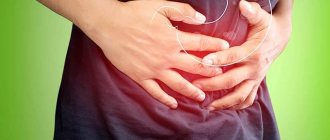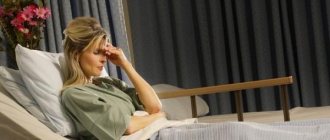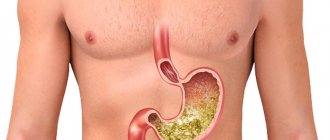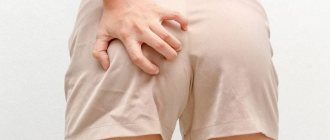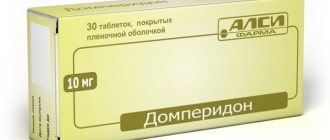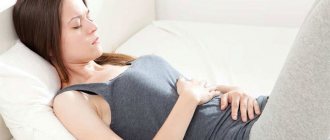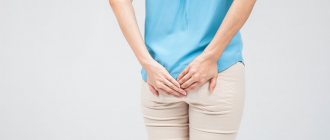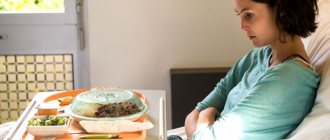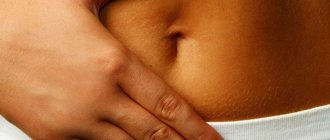Itching with hemorrhoids: causes, provoking factors
If we talk about why hemorrhoids itch, then among the main causes of anal itching are:
- Hygiene habits.
- Infections.
- Skin diseases.
- Long-term constipation or chronic diarrhea.
- Eating certain foods and drinks.
- Use of certain medications.
In addition, itching with hemorrhoids is provoked by:
- allergic reaction of the body to plant pollen, animal fur and other factors;
- stress;
- secondary infection of microtraumas of the rectal mucosa or skin of the anorectal area;
- overeating at night.
There is postoperative itching in the anus with hemorrhoids, which indicates the process of regeneration of damaged tissue.
What to do if you experience a burning sensation in the anus?
The problem should not be ignored. The causes of burning and pain in the anus can be harmless or quite serious. First of all, you need to consult a proctologist or therapist. The specialist must prescribe a full examination, tests and examination. In some cases, there is a need for additional consultations with other doctors. Often, to obtain a complete clinical picture, the attending physician refers for examination to a gynecologist (women), urologist, gastroenterologist, or dermatologist.
Important! Having collected a full range of tests during a diagnostic study, a specialist will be able to establish an accurate diagnosis, identify the cause and select the most appropriate therapy.
If the patient not only experiences burning and pinching in the anus, but also has purulent or sanguineous discharge, then a visit to the doctor should not be postponed for any time. The development of purulent processes can lead to blood poisoning, an abscess and quite serious consequences.
VIDEO “WHY DOES PAIN AND BURNING OCCUR IN THE ANUS?”
Diseases, the symptom of which is itching of the anus
The lead in anal itching, of course, belongs to hemorrhoidal pathology. But there are other diseases that are accompanied by discomfort, burning and itching of the anus:
- neoplasms of the rectum (malignant and benign);
- parasitic infestations;
- infections of any origin (discharge of pathological exudate from the anus against the background of hyperthermia and intoxication);
- anal leakage;
- fissures of the anus, rectum, anorectal area;
- diabetes;
- psoriasis, eczema, common dermatitis;
If hemorrhoids itch, you can think about developing proctitis or paraproctitis, as well as the beginning of abscess formation of perirectal tissues.
Reasons for this condition
A huge number of factors can affect the occurrence of pain and itching in the rectal area.
There are primary causes (related to gastrointestinal diseases) and secondary causes:
- haemorrhoids;
- polyps;
- parasites;
- urethritis and prostatitis;
- fistulas and cracks;
- gynecological problems in women.
Insufficient hygiene
The first reason is banal and, fortunately, easily eliminated. This is insufficient anal hygiene. This occurs when it is not possible to use a shower or bidet after a bowel movement. Thus, the skin around the hole becomes inflamed and irritated. This can also happen when using wet alcohol wipes.
Haemorrhoids
This is one of the most common causes of anal burning. With hemorrhoids, the veins in the anus become swollen. This causes severe burning and pain, and sometimes bleeding.
You can reduce the inflammation process with the help of traditional medicine or various ointments.
Rectal fissures
Itching may be associated with a rectal fissure, often developing as a result of chronic constipation. This problem is treated with medicinal ointments or through surgery.
Inflammatory diseases of the rectum
This pathology can cause irritation and burning in the rectum, as well as minor bleeding.
Inflammatory diseases of the rectum can cause stomach cramps and pain under the ribs after eating.
Diseases of individual organs
A burning sensation in the anus in men may be associated with prostatitis. Inflammation of the prostate gland can develop due to infection entering the prostate. In addition to burning and itching in the rectal area, a man experiences discomfort when urinating and problems with potency.
Urethritis can also cause discomfort in the anal area. This is an inflammation of the urethra caused by viruses and bacteria. A man feels pain when urinating, the genital organ becomes inflamed, and pus may be released from it.
Diabetes
Diabetes mellitus can also cause itching in the rectum. This is due to the specific composition of the blood and all body fluids.
Many diabetics suffer from obesity. It causes severe sweating and abrasions of the skin between the folds. Hence the pain and severe burning sensation. Diabetics can feel such symptoms not only between the legs, but also under the arms and near the chin.
Worm infestations
Burning and itching in the anal area, especially at night, can be caused by parasites. Worms can get there through the intestines.
Fungal infections
Warm, moist conditions around the rectal opening are an excellent breeding ground for fungi. A fungal infection can develop very quickly between the buttocks and lead to itching and a burning sensation, sometimes with swelling.
Skin diseases
Eczema can cause a burning sensation around the anus. Causes: dry skin, allergic reaction or infection.
Anal eczema greatly reduces a person's quality of life. It brings much more discomfort than ordinary eczema.
You can control eczema outbreaks with a special diet or by lubricating the inflamed area with natural creams and oils.
Psoriasis is another skin problem that can lead to a burning sensation in the area around the anus. Other symptoms are pain during bowel movements, blood from the anus and unbearable itching.
Anal psoriasis is quite difficult to diagnose, since the symptoms are similar to those of helminthic infestation, fungal infection and hemorrhoids.
How to understand that itching is hemorrhoids?
There is only one way to independently determine that itching of the anus is caused by hemorrhoids, and its external version is to palpate the external hemorrhoids near the anus.
If there are no other symptoms other than itching, then we can talk about anything. Since anorectal itching is a companion to many serious pathologies, if such a symptom appears, you should immediately seek advice from a proctologist.
Only a complete clinical and laboratory examination will allow one to exclude life-threatening itching pathologies and establish an accurate diagnosis. This will save someone's life.
Treating hemorrhoids at home
Many people try to treat this disease on their own at home, and fail after failure. Because the goal of treatment is not to get rid of symptoms, but to eliminate their causes.
The reasons can only be determined by a doctor after a thorough examination of the patient; based on its results, further treatment will be determined. It can be done at home.
To relieve itching in the anus and prevent the disease from progressing to the next stage, when it can only be treated surgically, the following rules must be followed:
- Stick to a diet rich in fiber - these plant fibers will not allow feces to stagnate in the intestines, thicken and cause constipation.
- Increase the amount of fluid you drink daily. There should be 30 ml of liquid per kg of human body weight. It can be water, juice, herbal tea or decoction, compote, but not coffee, alcohol, or soda.
- Eliminate or at least minimize confectionery and bakery products, all foods rich in carbohydrates.
- Adjust your daily routine - hours of physical activity and rest should alternate evenly. You can’t sit all the time or work physically all the time.
This is where the treatment of hemorrhoids begins. To prevent and relieve itching, you should take daily baths with a solution of potassium permanganate, and then treat the anus with baby powder or medical talcum powder. Talc will absorb excess moisture and relieve irritation.
Excessive pressure, friction, mechanical irritation from underwear and clothing are other causes of itching in the anus.
Therefore, if you have hemorrhoids, you should avoid wearing tight clothes. Under no circumstances should you scratch knots and bumps, no matter how unbearable the discomfort is - this will only lead to even greater inflammation, and therefore itching and burning too.
Treatment can be carried out using pharmaceutical products:
- Local ointments;
- Rectal suppositories;
- Cream for external use and preparation of tampons.
All these remedies help relieve inflammation and get rid of itching. The most popular and effective medications for grade 1-2 hemorrhoids are:
- Anuzole and Proctosan - these medicines are made on the basis of belladonna extract and have an astringent effect.
- Glycerin suppositories act in two directions, they allow you to get rid of microcracks and at the same time act as a mild laxative.
- Anestezin, Didocaine, Ultraproct - help quickly relieve pain during exacerbations of hemorrhoids.
- Baralgin and Spazmalgon - these antispasmodics also help cope with pain and discomfort from hemorrhoids.
Suppositories and ointments containing propolis, adrenaline and collagen fibers will help get rid of bleeding hemorrhoidal cones. Suppositories with sea buckthorn and calendula have bactericidal properties, they eliminate inflammation and promote the healing of microcracks.
For severe pain and inflammation, treatment with corticosteroids is indicated - these substances are also contained in some suppositories for hemorrhoids. For purulent inflammation, severe swelling, pain and bleeding, treatment with systemic drugs is prescribed. This:
- Detralex, Diosmin, Endotenol, Ginkor Forte - help restore the tone of veins and blood vessels;
- Clemastine, Zodak – relieve itching and swelling;
- Heparin - improves blood circulation, prevents the formation of blood clots, especially important if there is thrombosis of the hemorrhoid;
- Cefatoxime, Ceftriaxone are antibacterial drugs.
If suppositories, ointments, tablets and diet are not effective, minimally invasive treatment can help. What does this mean? A minimally invasive method of surgical intervention is not yet a full-fledged operation, but already a certain mechanical effect on the foci of inflammation. The following events are held:
- Ligation of prolapsed hemorrhoids.
- Therapy with laser, ozone, infrared rays.
- The introduction of drugs with anti-edematous and anti-inflammatory effects directly into the nodes themselves.
Removal of hemorrhoidal cones by surgery is carried out only if all other methods for some reason are not suitable or do not give the expected result. As a rule, such measures are required for advanced forms of the disease. This method is radical.
But this does not mean that after the operation the patient can do nothing else and forget about hemorrhoids forever. He will remain in a hospital setting under medical supervision for some time.
It is required to observe bed rest at first, adhere to a diet and a certain daily routine.
How to get rid of itching and burning with hemorrhoids?
Most often, the itching and burning sensation of hemorrhoids can be eliminated on your own if the cause is well known and the treatment has long been prescribed by the attending physician. But there is no need to delay with professional advice if:
- The itching is constant and severe.
- Accompanied by bleeding.
- There is inflammation, that is, infection is likely.
- It is impossible to understand the cause of the itching.
After the examination, the doctor will prescribe appropriate antipruritic external and systemic (if necessary) therapy.
Suppositories and ointments with antipruritic effect
If hemorrhoids itch when the nodes are located externally, ointments are pathogenetic:
- heparin ointment and Hepatrombin G - against thrombosis, for resolving a blood clot and relieving itching;
- Levomekol, Gentamicin, Tetracycline, Clotrimazole, Triderm - to relieve inflammation, itching of an infectious nature and prevent secondary infection;
- Hydrocortisone ointment, Ultraproct, Flucinar, Lorinden, Betamethasone - quickly relieve acute inflammation and burning, but are contraindicated for fungal or bacterial infections due to hormonal supplements;
- Bepanten, Panthenol, Fleming's ointment, Posterisan, Bezornil relieve itching during pregnancy;
- Relief Advance, Procto-Glivenol, Aurobin, Proctosedyl relieve not only itching, but also acute pain due to the inclusion of an anesthetic in the composition.
- Belogent is a remedy with antipruritic, antibacterial and antihistamine effects.
- Celestoderm – reduces inflammation, exudation, itching.
In all cases, it is necessary to observe the correct dosage and duration of course therapy.
Treatment
General recommendations
To relieve symptoms of the disease and prevent exacerbations, follow these dietary and hygiene recommendations:
- Eliminate irritating foods from your diet: spices, hot seasonings, tomatoes, caffeine-containing drinks;
- in case of an allergic reaction, follow a hypoallergenic diet: exclude citrus fruits, chocolate, eggs, whole milk, preservatives and dyes;
- wash yourself twice a day with cool water without soap or intimate hygiene products;
- wash the perianal area after each bowel movement;
- wear loose underwear made from natural fabrics, avoid tight clothing;
- when mucus is discharged from the anus, use a gauze pad;
- change your underwear daily;
- refuse scented toilet paper;
- eliminate alcohol and smoking.
Eliminating the cause of the disease
Secondary itching decreases with treatment of the underlying disease.
- Antihelminthic therapy: Mebendazole, Albendazole, Pyrantel.
- Treatment of exacerbation of hemorrhoids is normalization of stool using diet and laxatives. Detralex and Aescusan to improve venous tone; suppositories with anti-inflammatory and healing effects (Relief, Natalsid, Proctosedyl). In the future - surgical treatment.
- Treatment of anal fissure - Methyluracil and Natalsid in suppositories for healing, injecting with novocaine for pain relief, regular cleansing enemas. If ineffective - surgery.
- Local and general remedies for the treatment of sexually transmitted infections - antibiotics, antiviral drugs, cauterization of condylomas.
- Correction of blood glucose levels in diabetes mellitus: hypoglycemic drugs (Glibenclamide, Metformin, Glibomet), insulin therapy.
Antipruritic measures
- Microclysters with protargol solution - a silver preparation with an antiseptic effect.
- Treatment of the itchy area with antiseptic and painkillers: 1% salicylic alcohol, novocaine solution, menthol.
- Powders with talc and methenamine - reduce sweating and irritation.
- Hormonal ointments - reduce inflammation and itching. They use combination products containing hormones and antibiotics (Triderm, Ultraproct).
- Antihistamines - drugs to combat allergies, block histamine receptors, relieve itching, soothe (Loratadine, Cetirizine).
- Sedatives - herbal preparations have a mild calming effect (valerian extract in tablets, peony tincture, motherwort).
- Antidepressants and tranquilizers are prescribed for persistent severe anal itching, which is accompanied by sleep disturbances and depression. The drugs normalize the emotional background and have a hypnotic effect (Amitriptyline, Diazepam).
- Intradermal administration of a solution of novocaine and methylene blue is recommended when other treatment methods are ineffective to reduce skin sensitivity. Contraindication – weeping skin defects.
- Physiotherapy - Bernard currents, ultraviolet irradiation of the perianal area, laser therapy, underwater shower.
Be sure to read:
Appendicitis: main signs and treatment of pathology + FAQ
Folk remedies
Use traditional medicine recipes in addition to doctor's prescriptions. Sitz baths with infusions of medicinal plants give a good effect:
- chamomile;
- calendula;
- series;
- oak bark
Take 3 tablespoons of dry raw materials, pour into an enamel pan, pour in a liter of boiling water, cover with a lid, leave for about 40 minutes.
Cool to 37°C, strain and pour into a bowl. The duration of the procedure is half an hour. Herbs can be alternated and combined. If there is itching and burning in the anus, exclude provoking factors. If general recommendations on hygiene, nutrition and lifestyle do not help, do not delay visiting your doctor!
In continuation of the topic, be sure to read:
- More about hemorrhoids: causes, symptoms and treatment methods
- Rectal fissure: causes, symptoms and treatment of pathology
- Rectal cancer: symptoms, stages, treatment and prognosis for life
- Diseases of the rectum: symptoms and signs of the disease, treatment
- Diseases of the anus: signs, diagnosis and treatment of pathologies
- Cryptitis: definition of pathology, symptoms and treatment methods
- Rectal prolapse: how is the pathology manifested and treated?
- Irritable bowel syndrome: symptoms and treatments
- Intestinal thrombosis: why does it occur and how to treat the pathology?
- Mucus in the intestines: why does it appear and how to treat the pathology?
Diet: foods that cause burning in the anus
The connection between diet and anal itching has not yet been studied well, but doctors recommend avoiding foods that increase symptoms. These can be spicy, hot, sour, salty, smoked foods that were consumed the previous day. The anus can become especially itchy if a small amount of stool remains on the anal skin after wiping.
Italian researchers believe that chili peppers, dairy products, herbs, spices, cola and coffee can trigger anal itching.
How to remove itching without medications, preventive measures
There are several ways to get your itching under control. They relate to lifestyle and self-care. The recommendations are simple, but they must be followed constantly:
- You should eat foods high in fiber to prevent constipation: vegetables, fruits, legumes, whole grain bread, prunes, apples, bran bread, boiled lentils (up to 35 g/day, today the packaging says how much fiber is contained in a particular product );
- instead of dry toilet paper - wet or rinsing with cool water after each bowel movement (if possible - a bidet or hygienic shower);
- exclude wearing tight underwear and clothing, choose natural fabrics, eliminate thongs from everyday use;
- try to resist the burning sensation of hemorrhoids by not scratching the anus: be patient, trim your nails, wear clean cotton gloves at night;
- Cold compresses and a warm bath will help relieve itching;
- Constipation should be monitored and concomitant pathologies treated promptly;
- It is recommended to remove seasonings, spices, coffee, energy drinks, and sweet soda from the menu;
- connect exercise therapy.
Any prescription must be agreed with a doctor.
Treatment with folk remedies and its effectiveness
Traditional medicine has in its arsenal a huge supply of various remedies that help get rid of many diseases, and the burning sensation of hemorrhoids is no exception to the general list.
Treatment of such problems with the help of folk remedies is carried out based on the following methods:
- baths;
- lotions;
- homemade ointments.
Herbal baths can be used in conjunction with the main therapy without fear of reducing its effectiveness or affecting the overall structure of treatment. Their use prolongs the effect of medications and promotes their better absorption. The general course of treatment using this technique is at least 6-7 days and can be continued until the disease is completely neutralized.
Lotions can be based on either the use of various decoctions or the use of alcohol tinctures. At the same time, it is not advisable to use alcohol-containing products in cases where hemorrhoids have become severe and are accompanied by prolapse of purulent nodes.
Baths and lotions are formed based on a decoction of medicinal herbs, such as chamomile, thyme, string, wormwood, nettle, celandine and other disinfectants. It’s quite simple to prepare them by brewing 2 tbsp. l. dried herbs in 200 ml of boiling water and let the mixture brew for 20-30 minutes.
Homemade ointments can reduce the burning sensation, and they can be made from ordinary Vaseline or honey, to which crushed medicinal herbs, zinc, chalk or other components are added.

